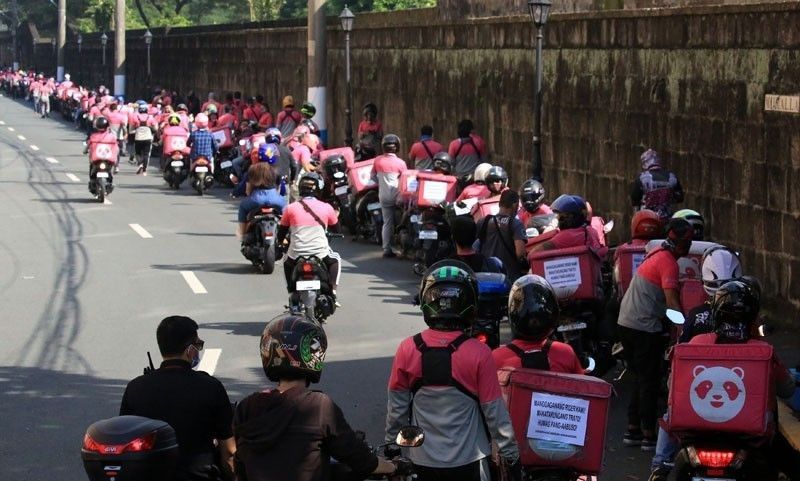Ruling favoring dismissed Foodpanda riders spotlights need to protect gig workers

MANILA, Philippines — After illegally dismissed riders of Foodpanda Philippines scored a victory against the company, analysts underscored the need to rethink social protections for workers in the country’s nascent gig economy.
Acting on a complaint filed by Davao United Delivery Riders Association Inc. (DUDRAI), the 8th Division of the National Labor Relations Commission (NLRC) affirmed on Dec. 7 their June 2022 ruling favoring DUDRAI. The decision stated that the delivery riders, illegally dismissed by Foodpanda Philippines, were regular employees.
Foodpanda told Philstar.com in a statement on Thursday it already filed its appeal with the NLRC.
The decision handed down by the labor arbiter asserted that an employer-employee relationship existed between Foodpanda and the couriers. This clear-cut relationship with an employer helps workers secure livable wages, benefits and even tenure.
The DUDRAI indicated that control wielded by the food delivery platform over these contract workers was observed through the following: supervision throughout work shifts; barring couriers from seeking additional work; and “algorithmic disciplinary measures indicate strict supervision and control over its delivery riders.”
DUDRAI was one of the complainants in the illegal dismissal complaint against Foodpanda.
That said, the Labor Code of the Philippines does not recognize gig workers. This means these “independent contractors” have close to no protection against violations, breaches and whatnot.
Workers’ rights?
The complainants were delivery riders under Foodpanda before they found themselves barred from accessing the company’s rider application. These couriers called for some measure of transparency on how their pay was calculated, which include deductions.
They filed a case of illegal dismissal. The company denied an employer-employee relationship ever existed between the parties since they were engaged for their services as independent contractors.
Foodpanda was acquired by Berlin-based Delivery Hero back in December 2016, a company headquartered in a country that recognized and respected labor rights.
Sought for comment, Sonny Africa, executive director of non-profit think tank IBON Foundation said the decision was significant since it spotlighted how digital technologies exploit workers.
“The glorification of gig economy or platform workers as ‘independent contractors’ or ‘freelancers’ has always really been just a smokescreen for technology-driven flexibilization of workers,” Africa said in a Viber message.
The Philippines saw an explosion of sorts within the gig economy at the onset of the pandemic in 2020. Filipino workers who found themselves unemployed at the height of the crisis sought ways to make ends meet—and companies like Foodpanda offered some respite from pandemic misery.
These companies saw their fortunes transform overnight. Since pandemic restrictions forced many indoors, Filipinos turned to delivery platforms for their needs.
As independent contractors, or “partners” as what these tech companies call them, they had a handle on how long they would need to work. These came at a cost.
A 2021 study penned by the Ecumenical Institute for Labor Education and Research (EILER) found that Foodpanda charged its delivery riders P3,000 for one big and one small thermal bag, and two dry-fit shirts. If the items get damaged, the workers need to pay the company again.
The report cited a Grab Philippines delivery rider, who said that the company required purchases of the thermal delivery bags chocked with the company’s logos. These can set couriers back by as much as P2,500.
DUDRAI found itself at the center of one.
The group organized a mass protest in July 2021, after Foodpanda cut the wages of their independent contractors.
These riders were even barred from organizing themselves to protect their rights by creating labor unions. This, despite the stringent need for companies to distance their relationship to these “independent contractors.”
Standards?
Even then, the labor arbiter sided with the complainants in June 2022. The NLRC ruled that Foodpanda was liable for illegally terminating the employment of the complainants.
The NLRC ordered Foodpanda to cover the lawyering fees of the seven complainants, totaling P222,346.68.
“This is a landmark decision for every delivery rider who have been at the frontlines since the pandemic. This is the product of our collective action and our determination to assert our rights, even against a seemingly formidable opponent,” said Edmund Carillo, the president of DUDRAI and one of the complainants.
Carillo expects Foodpanda to appeal its case to the Supreme Court. That said, this could turn into a long-winded legal battle but could spark hope for Filipino workers who long for protection and recognition.
Rochelle Porras, director of EILER, noted the NLRC’s decision will benefit workers participating in the gig economy.
“If any, the decision should be a stepping stone in improving working conditions of platform workers and those working in the gig economy. Platform workers are entitled to their labor rights and social protection,” she said in a Viber message.
She cited cases in other countries where proposals raised clamored for the recognition of platform workers as employees.
Leonardo Lanzona, a labor economist at Ateneo De Manila University, said the decision was a positive development.
“The situation indicates the need to establish the guidelines for social protection given to workers in online labor platforms like Foodpanda,” he said.
Lanzona pointed out that while the decision could discourage online platforms from being created, labor policy in the country needs to be reexamined. Despite existing labor laws, such as mandated 13th-month bonuses, the Philippines is home to dismal minimum wage standards.
“One particular solution is to create a universal basic income program or even unemployment insurance for all workers so that innovative and flexible arrangements can prosper,” Lanzona added.
- Latest
- Trending



























